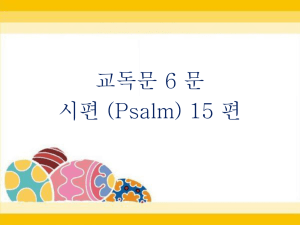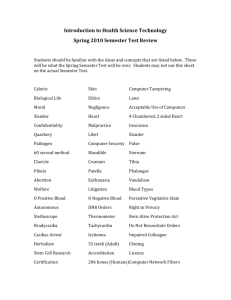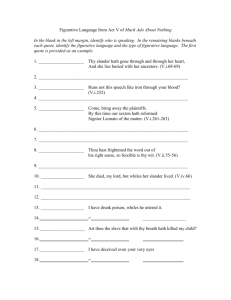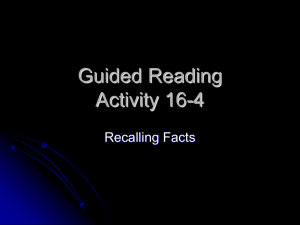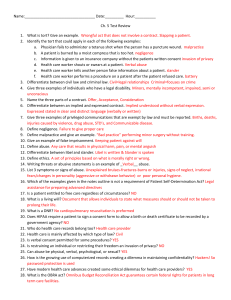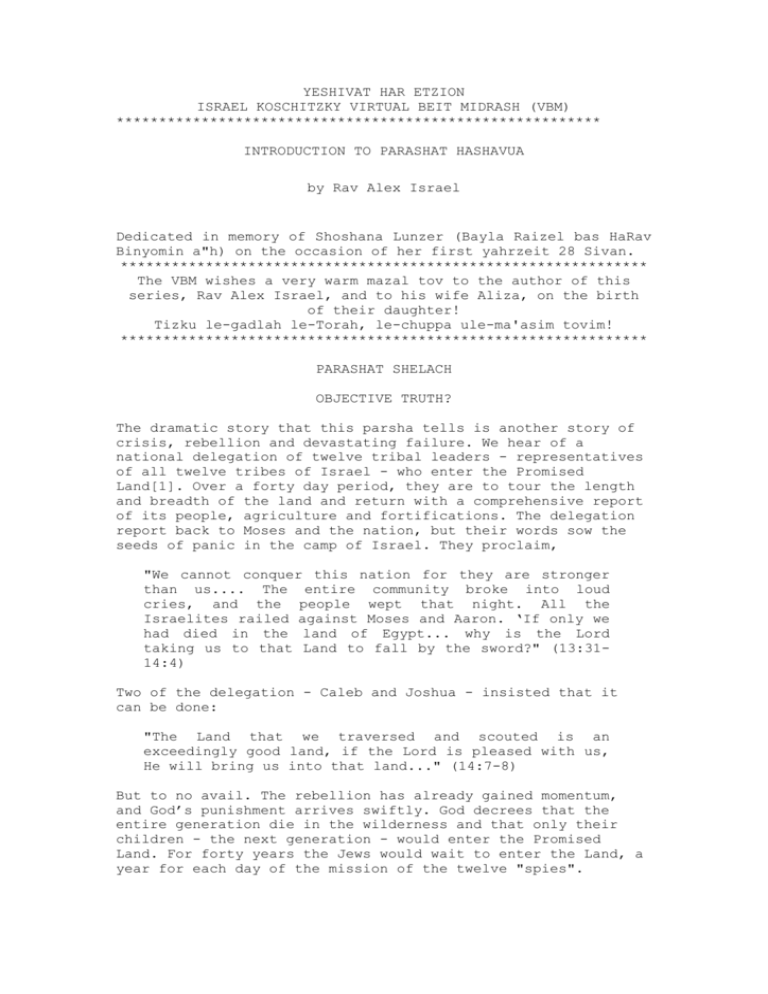
YESHIVAT HAR ETZION
ISRAEL KOSCHITZKY VIRTUAL BEIT MIDRASH (VBM)
*********************************************************
INTRODUCTION TO PARASHAT HASHAVUA
by Rav Alex Israel
Dedicated in memory of Shoshana Lunzer (Bayla Raizel bas HaRav
Binyomin a"h) on the occasion of her first yahrzeit 28 Sivan.
**************************************************************
The VBM wishes a very warm mazal tov to the author of this
series, Rav Alex Israel, and to his wife Aliza, on the birth
of their daughter!
Tizku le-gadlah le-Torah, le-chuppa ule-ma'asim tovim!
**************************************************************
PARASHAT SHELACH
OBJECTIVE TRUTH?
The dramatic story that this parsha tells is another story of
crisis, rebellion and devastating failure. We hear of a
national delegation of twelve tribal leaders - representatives
of all twelve tribes of Israel - who enter the Promised
Land[1]. Over a forty day period, they are to tour the length
and breadth of the land and return with a comprehensive report
of its people, agriculture and fortifications. The delegation
report back to Moses and the nation, but their words sow the
seeds of panic in the camp of Israel. They proclaim,
"We cannot conquer this nation for they are stronger
than us.... The entire community broke into loud
cries, and the people wept that night. All the
Israelites railed against Moses and Aaron. ‘If only we
had died in the land of Egypt... why is the Lord
taking us to that Land to fall by the sword?" (13:3114:4)
Two of the delegation - Caleb and Joshua - insisted that it
can be done:
"The Land that we traversed and scouted is an
exceedingly good land, if the Lord is pleased with us,
He will bring us into that land..." (14:7-8)
But to no avail. The rebellion has already gained momentum,
and God’s punishment arrives swiftly. God decrees that the
entire generation die in the wilderness and that only their
children - the next generation - would enter the Promised
Land. For forty years the Jews would wait to enter the Land, a
year for each day of the mission of the twelve "spies".
SLANDER
A frequent question raised by the classic Torah commentators
relates to positioning of passages. The great commentator
Rashi asks why this account of the rebellion by leaders and
nation against the Land follows on directly from the story of
Miriam’s slander against her brother Moses. The final passage
of last week’s parsha tells of a negative comment made by
Miriam in reference to her brother. Miriam is immediately
summoned by God Himself, accused of improper talk regarding
Moses - the leader and prophet - and emerges from her
encounter with God plagued with Leprosy, the traditional
punishment for slander - Lashon Hara. What connection may be
found between that story and this? Rashi (13:2) opens his
commentary to this epic story of the "spies" with the
following comment.
"Why is the story of the spies juxtaposed with the
passage about Miriam? Because she (Miriam) was stricken
on account of the slander that she spoke regarding her
brother. These evil men (the spies - the delegation to
Canaan) witnessed it all but did not learn the lesson."
Rashi then feels that the sin of these national representatives
that he calls "spies", was an act of slander against the
Promised Land. Apparently, they blackened its name and maligned
its reputation. The result was that the people of Israel turned
their backs on that Land.
But can we really speak of slander when it comes to a Land, to
earth, rocks, mountains and rivers? We can slander a person. He
gets offended, he blushes and is embarrassed, he cannot show
his face in public. That is slander. But how can one slander a
land? Can one slander a building? a valley? a town? Does the
Land squirm and turn red? Does the building suffer pain?
FORGIVENESS
The above question was posed by the revered head of the Mir
Yeshiva, Rav Chaim Smulevitz zt"l, but he adds a second
question which is more troubling. It is well recorded how God
punished Israel after this episode by barring them from
entering the land for an entire generation. This is as severe a
punishment as one might imagine. It would appear that God is
furious with his "stiff-necked", obstinate rebellious nation,
and short of destroying them completely, he selects a
punishment of extreme proportions.
Yet the way the punishment is phrased is strange and puzzling
indeed. Immediately preceding the proclamation of this
devastating punishment, we read a statement of divine
forgiveness. :
"And the Lord said ‘I pardon, as you have asked’." (14:20)
In the first tense filled moments of Yom Kippur, at the start
of the Kol Nidrei service, the community takes this verse and
chants it three times. We take hold of this verse, this
statement - of God’s complete forgiveness of Israel, of God’s
wiping the slate clean of our past wrongdoing - and ask God to
repeat his act of the past once again. This verse, a mantra of
supreme forgiveness originates here, as God tells Moses how he
"pardons" the nation.
But do the
comments:
nation
gain
their
pardon?
Sforno
(on
14:20)
"I have forgiven you to the extent that I will not
destroy you (v.12).... I will not annihilate the nation
at once; however I will kill you off in stages, year by
year, and not one person will enter the Land."
So are the people forgiven or are they not? Why would God tell
us that we have been pardoned, let off the hook, when the next
verse explicitly issues a punishment:
"Nevertheless, as I live and as the Lord’s presence
fills the whole world, none of the men... shall see the
Land that I promised on oath to their fathers, none of
those who spurn Me shall see it..." (14:21-23).
So we have two questions. The first relates to the nature of
slander. Can we slander a land? The second: If the nation was
forgiven, then why are they not allowed to enter the Promised
Land?
SPEAKING AND LISTENING
Let us begin by examining a statement from Maimonides in his
code of Law - Mishne Torah - where he outlines the laws of
slander and evil talk (Lashon Hara). There he states:
"The Rabbis state, evil talk kills three: the speaker,
the listener (lit. the receiver) and the object of
their slander; the listener more than he who speaks."
(De’ot 7:3)
This is a strange comment. We can well imagine that the person
who spreads gossip is culpable and at the same time, the object
of the slander is maligned. A person’s life can be ruined by
rumor and slander, and the perpetrator of that gossip is
guilty. But what of the listener? Why does Maimonides include
the person who hears the slander as someone who is "killed" by
the information he hears?
We might suggest that in fact, the person most affected by
slander IS the listener. When one hears something negative
about a person, ones perception of that person changes. The way
one relates to the object of gossip is transformed the moment
that one receives that information. After this moment, the
relationship is going to be different for ever. Has this ever
happened to you? You hear a piece of information about someone.
The next time you meet that person, you can’t look them in the
face without this item floating to the surface. When you meet,
you view that individual strangely; "Did he really do that? Did
that really happen to her? How could he?". Now, we can only see
that person through the prism of our newfound information.
Maimonides is accurate in his choice of language. It is not so
much the listening to gossip that affects us. It is more than
that. It penetrates deep, it seeps in. The gossip is received
by the listener and it never leaves him.
ALTERED PERCEPTIONS
Can we talk of slander about a land? We most definitely can. We
can have slander of a school, a synagogue, a community,
anything! How so? Whenever we hear some information which
affects our image of something, our mind has been poisoned, we
have become a victim of slander. If we hear something bad about
a particular school, a scandal that took place in a certain
community, we will look differently at them from this moment
forth. With a school, a child will now not be able to learn as
he did before, with a synagogue, we will be unable to receive
the spiritual power, the opportunity for prayer and religious
growth that we might have found before that moment when we
heard that gossip. Our perceptions and our consciousness are
altered forever.
The Land of Israel was to offer the Jewish nation a unique
opportunity. It was to become the place where they would live
out a dream. It would be a place where they could fulfill the
values of ethical monotheism, the legacy of God’s law. The
question is, whether the people are receptive to the land. Are
they open to that which the land can offer? Is the Promised
Land seen as a land of promise?
Until this episode, the Land seemed good, it lay "flowing with
milk and honey" in the collective consciousness. Until that
auspicious day when the delegation returned from the land with
the first eyewitness reports of the territory that this
fledgling nation would have to conquer. The people knew that
they were going to war but they trusted the fact that God would
not send them on a mission impossible. But then, the "spies"
returned. The respected leaders came back with talk of giants
and Amalek.
"They spread slander among the Israelites about the land they
had toured saying, ‘The country that we traversed and scouted
is one that devours its settlers. All the people that we saw in
it are men of great size.... we looked like grasshoppers to
ourselves, and so we must have looked to them." (13:31-33)
The people heard this and panicked They cried all night long;
"Why is the Lord taking us to that Land to fall by the sword?"
(14:4). They are gripped by terror and an image of a land which
means imminent death for all who enter its borders. The shouts
of Caleb and Joshua fall on closed ears. Ten spies return with
a negative report, who will listen to the two who are for God’s
plan. The people rally against God and His plan. They refuse to
enter the Land, they propose a return to Egypt.
After this event, after Moses has prayed and the crisis is
over, and God has pardoned them, what remains? The indelible
mark of this episode still casts its stain over the public in
their perception of the Land. A nation who have cried all night
will never be able to relate to this land as a positive land
offering them opportunity and promise. They will always have an
image, lurking in the shadows, of this land as a land of death,
an image which will readily surface at the first sign of
defeat, at the first setback.
Have the people been forgiven? Yes. Can they enter the Land?
They cannot enter. If they did, the entire enterprise would be
doomed to failure from the opening step. The first war, the
first crisis, the first defeat would have everyone crying
again. Like the wounds of a trauma victim, the psychological
wounds of this traumatic incident will not be easily removed
from the national subconscious.
CONCLUSION
So the slander did not affect the object. It affected the
listener. In the words of Maimonides, the listener, the one who
received the information into his heart and mind, was affected
in the most extreme way. The Children of Israel, impressionable
just like children (aren’t we all?) could not erase their
negative perceptions of the land from their minds and hearts.
Their not entering the land was not a punishment. Rather, it
was a direct outgrowth of the incident. Yes they had been
forgiven, but only the next generation, free of the haunting
images of the land "which consumes its settlers", would go into
the Promised Land. They would be able to take the land for what
it was. They would not have the Emotional scars of a night of
tears.
Even today, we frequently speak disparagingly about Israel. Let
us be reminded and cautioned. Let us not spoil what Israel
might offer us by our careless words. Let us ensure that the
Holy Land remain in a position that it can offer us
spirituality, national promise, a sense of collective identity.
Let us be careful lest our words destroy the opportunity, for
us, our children communities and associates, to receive the
promise from the Promised Land, even today.
Shabbat Shalom
FOOTNOTES
[1] The twelve man delegation are referred to in the Rabbinic
literature as the "spies". In the Bible, they are simply
described as "anashim" - men - giving no indication of a
specific military role or covert objective in their mission. It
is clear from the listing of names (13:4-16) that these twelve
men are tribal representatives and not spies. My view following many classical commentators - is to see the group not
as spies but more as a national delegation who were supposed to
prepare the way, maybe in terms of morale, maybe in some
religious dimension, for the imminent entry into the land.
These national representatives were meant to endear the people
to their promised land rather than distancing the nation from
it. To this end, it is inappropriate to talk about "spies".
Nonetheless I will follow the traditional "labeling" of this
passage in the course of this article despite the possible
wrong impressions that may flow from it.
For more on this topic see the article in "Reflections of the
Rav vol. 1" entitled "The Singularity of the Land of Israel."
--------------------------------------------------------Last year's shiurim in Parashat HaShavua
are now posted on our website!
see http://www.virtual.co.il/education/yhe/thisweek.htm
--------------------------------------------------------*********************************************************
For direct questions or comments to the instructor, please
send email to intparsh@etzion.org.il .
*********************************************************
BE SURE TO VISIT THE "VIRTUAL CITY OF JERUSALEM"
WWW.VIRTUAL.CO.IL
*********************************************************
VISIT YHE'S WEB SITE:
HTTP://WWW.VIRTUAL.CO.IL/EDUCATION/YHE
*********************************************************
To
subscribe
send
e-mail
to:
LISTPROC@VIRTUAL.CO.IL:
subject:(leave blank or type word 'subscription'), on first
line of text type: sub YHE-INTPARSHA <your full name> .
Copyright (c)1998 Yeshivat Har Etzion. All rights reserved.
*********************************************************
SHIURIM MAY BE DEDICATED TO VARIOUS OCCASIONS - YAHRZEITS, BIRTHDAYS, ETC.
PLEASE E-MAIL YHE@VIRTUAL.CO.IL FOR AN APPLICATION.
YESHIVAT HAR ETZION
ISRAEL KOSCHITZKY VIRTUAL BEIT MIDRASH
ALON SHEVUT, GUSH ETZION 90433
E-MAIL: YHE@VIRTUAL.CO.IL or OFFICE@ETZION.ORG.IL

